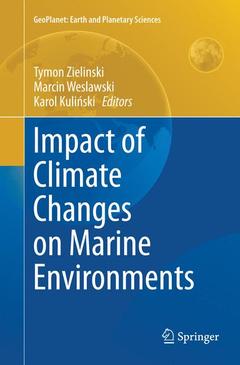Description
Impact of Climate Changes on Marine Environments, 2015
GeoPlanet: Earth and Planetary Sciences Series
Coordinators: Zielinski Tymon, Weslawski Marcin, Kuliński Karol
Language: English
Publication date: 10-2016
Support: Print on demand
Publication date: 03-2015
148 p. · 15.5x23.5 cm · Hardback
Description
/li>Contents
/li>Comment
/li>
This book contributes to the current discussion on global environmental changes by discussing modifications in marine ecosystems related to global climate changes. In marine ecosystems, rising atmospheric CO2 and climate changes are associated with shifts in temperature, circulation, stratification, nutrient input, oxygen concentration and ocean acidification, which have significant biological effects on a regional and global scale.
Knowing how these changes affect the distribution and abundance of plankton in the ocean currents is crucial to our understanding of how climate change impacts the marine environment.
Ocean temperatures, weather and climatic changes greatly influence the amount and location of nutrients in the water column. If temperatures and currents change, the plankton production cycle may not coincide with the reproduction cycle of fish.
The above changes are closely related to the changes in radiative forcing, which initiate feedback mechanisms like changes in surface temperature, circulation, and atmospheric chemistry.
Introduction.- Impact of breaking waves on sea salt production and local change of aerosol optical properties.- Annual changes of aerosol optical depth and Ångström exponent over Spitsbergen.- Sea spray aerosol fluxes in the near water boundary layer – review of recent achievements.- Acoustical and optical methods in Arctic zooplankton studies.- Submarine groundwater discharge to the Bay of Puck, southern Baltic Sea and its possible changes with regard to predicted climate changes.- Climate change influence on migration of contaminants in the Arctic marine environment.- The adaptations of the Foraminifera and Ostracoda to fresh water colonization.- Microbiological survey in two Arctic fjords: total bacterial number and biomass comparison of Hornsund and Kongsfjorden.- New methods in the reconstruction of Arctic marine palaeoenvironments.
Explains how marine ecosystems respond to climate changes
Describes the determining factors in marine ecosystem modifications
Contributes to the topical discussion on global environmental changes
Includes supplementary material: sn.pub/extras




